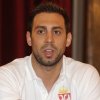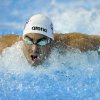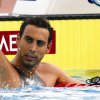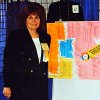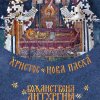From Official website
Name: Milorad Čavić
Nickname: Mike, and Čavke
Birthday: 31 May 1984
Height: 6’6” (198cm)
Weight: 215 lbs (97kg)
University: University of California at Berkeley 2007
Major: Political Economics
Interests: Spending time with friends and family, movies, documentaries, nightlife, sports, animals, spear fishing, traveling.
Movies: Gladiator, Without Limits, Cool Runnings, Lepa Sela Lepo Gore, Profesionalac.
Music: Club Mixes/Techno, Rock, and Serbian music.
Hero: Steve Prefontaine (Track and Field Runner)
Sports of Interest: Volleyball, Waterpolo, Basketball, Soccer.
Favorite Quote: “A race is a work of art that people can look at and be affected in as many ways as they’re capable of understanding.” – Steve Prefontaine
Best Times
Long Course 50m:
- 50 Butterfly: 23.11
- 100 Butterfly: 50.59 (World Ranking: 2nd in 2008)
- 100 Freestyle: 48.15
Short Course 25m:
- 100 Butterfly: 49.18
- 50 Freestyle: 21.49
- 50 Butterfly: 22.36
My Achievements
- 3 Olympic Teams,
- Olympic Silver Medalist – 100m Butterfly (2008)
- Former World Record Holder – 100m SCM (Short Course Meter) Butterfly (2003), Currently Stands as European Record,
- European Record Holder in 50 and 100 LCM (Long Course Meter) Butterfly
- 3-Time World Championship Finalist,
- 5-Time Senior European Champion,
- 2-Time Junior European Champion,
- National High School Swimmer of the Year 2002,
- High School National Record Holder 50 Yard Freestyle.
About Me
Swimming has been a large part of my life and has influenced me as a man in every way I can think possible. Ever since I learned how to swim, the water has opened up a world of creativity to me and has introduced me to the notion of competitiveness. The simple act of playing in the water whether it was splashing, diving, or swimming, has challenged me to figure out newer and better ways of performing each act. The beauty of this whole experience was that I enjoyed every moment of it – that I loved what I was doing, and that it simply made sense to me. Everything I did was exploratory and with reason to become faster and more agile. I felt my understanding and feeling if the water gave me the confidence that I needed to take further steps toward bigger things in my life… things, which I was unaware of at that point. What I realized was that the pool environment was my haven, and I felt deeply that water was going to help me discover my life’s greatest passion – racing! For most of my career I had been fortunate enough to see the time and efforts of my training convert into best times and successes. I coasted through high school daydreaming of the perfect race almost on a daily basis. My daytime thoughts had become so convincing that I felt the exhilaration of an adrenalin rush during my everyday activities. It’s true.But the other side of the truth is, the passion wasn’t a continuous trend throughout my career. I can actually pinpoint the moment that changed my life and dramatically changed my attitude toward swimming. In December of 2003, I unexpectedly broke the world record in the 100 short course meter butterfly at the European Championships in Dublin, Ireland. My dream had finally come true – the mental images and race simulations which I ran through my mind thousands of times, had finally come into realization. I was on top of the world! When I left Ireland, my dreams stayed behind also… my lifetime goal of breaking a world record and pushing the limits of what was humanly possible had been accomplished. What was I to do next? The answer seemed so black and white – I was supposed to create a new goal and look to the future. The problem was that the fire inside of me had diminished. I felt my soul had become empty eight months before the 2004 Olympics and that marked the beginning of my career’s 2 year “dark age”.
What happened next was a disastrous experience in the 2004 Olympic Games. I cruised through the preliminaries in the 100 meter butterfly, easily making the semi-finals. When In the semi-finals, I ran into trouble after the first 50 meters of my race when water entered and was trapped in my racing suit due to a defect in the suit. That marked the end of my second Olympic run. The following year, I had begun suffering intense lower back problems, and it more or less kept me from training at full potential for more than 2 weeks at a time. I found myself taking a few days off every other week… the pain was unbearable when it hurt. In 2005 I did not accomplish anything noteworthy, and this trend of pain continued throughout the end of my collegiate career in March of 2006.
I unofficially quit swimming at the end of the NCAA Championships in March of 2006 and did not plan a return. I was tired of the pain and the long hours of work with absolutely no results to show for it at the end of the season. During my four months out of the water, I focused on school and enjoyed the other things life had to offer. During this time, a swimmer had also temporarily moved into my apartment for a month and although I wasn’t at the pool anymore, he reminded me of how much fun it was to be apart of the swimming environment. These reminiscences had provided me with the basis of which I experienced a complete identity crisis. I realized that I wasn’t happy and that I wasn’t the same man I had always known myself to be. Finally, after the fourth month, I couldn’t stand it – I was returning to the pool! From August to December of 2006 I had trained harder than ever, and managed to win two European Championship titles in Helsinki that month. I was back! After nearly a month out of the water due to school obligations and sponsorship searching, I returned to the pool for 2 months of hard training before the Melbourne World Championships where I posted the 3rd fastest time of the year. From this point on, I was convinced that with more steady training and a new passion for the sport, I would be in position to win an Olympic medal.
In June of 2007, after graduating from Berkeley, I followed my coach Mike Bottom to the Florida Keys where I rigorously trained for the following 14 months until the Olympics. It was the most difficult period of my life, both physically and psychologically. We were very machine-like during this time – we lived to do only one thing, and that was to train. Every other day we trained for 3.5 hours, twice a day, and the days between for only 3.5 hours. When we didn’t workout, we ate and we slept. We lacked the energy and time to do anything else… Swimming was life, and with the pursuit of an Olympic dream, nothing else seemed to matter. Very little about how we lived seemed humane – We disconnected ourselves from our loved ones, we didn’t have very many options to get our minds off of swimming, and we had only our teammates, who were as broken physically and mentally as the next, as immediate support to keep up each other’s moral. I became a cold person, at least colder than I’ve ever been before. Naturally, I fell into a period of crisis where my emotions changed by the minute. The stress brought me to think about quitting quite frequently during the day and insomnia terrorized me at night… but I made a commitment to myself – to my heart and to my dreams, that I would force myself through this period so that I could perhaps some day realize Olympic glory.I’m assuming since you’re here reading this, that you already know what happened at the Olympic Games in Beijing, so I’ll spare you the insignificant details of how I did what I did. To me, the most significant and memorable part of my experience is that I won the Olympic silver medal in what was arguably the greatest and most exciting race of the 2008 Olympic Games. Despite the controversy that followed the race, I accepted defeat to the greatest swimmer the world has ever known by the smallest of margins in competitive swimming. Following the Olympics, I took some time off to rest my body and mind, and after two months, a new fire was rekindled inside of me… a new goal and desire, one from the depths of my heart – To show the world what I capable of in my quest to break the world record in the 100 meter butterfly and be crowned World Champion at the 2009 World Championships in Rome, Italy… and so my journey continues…

